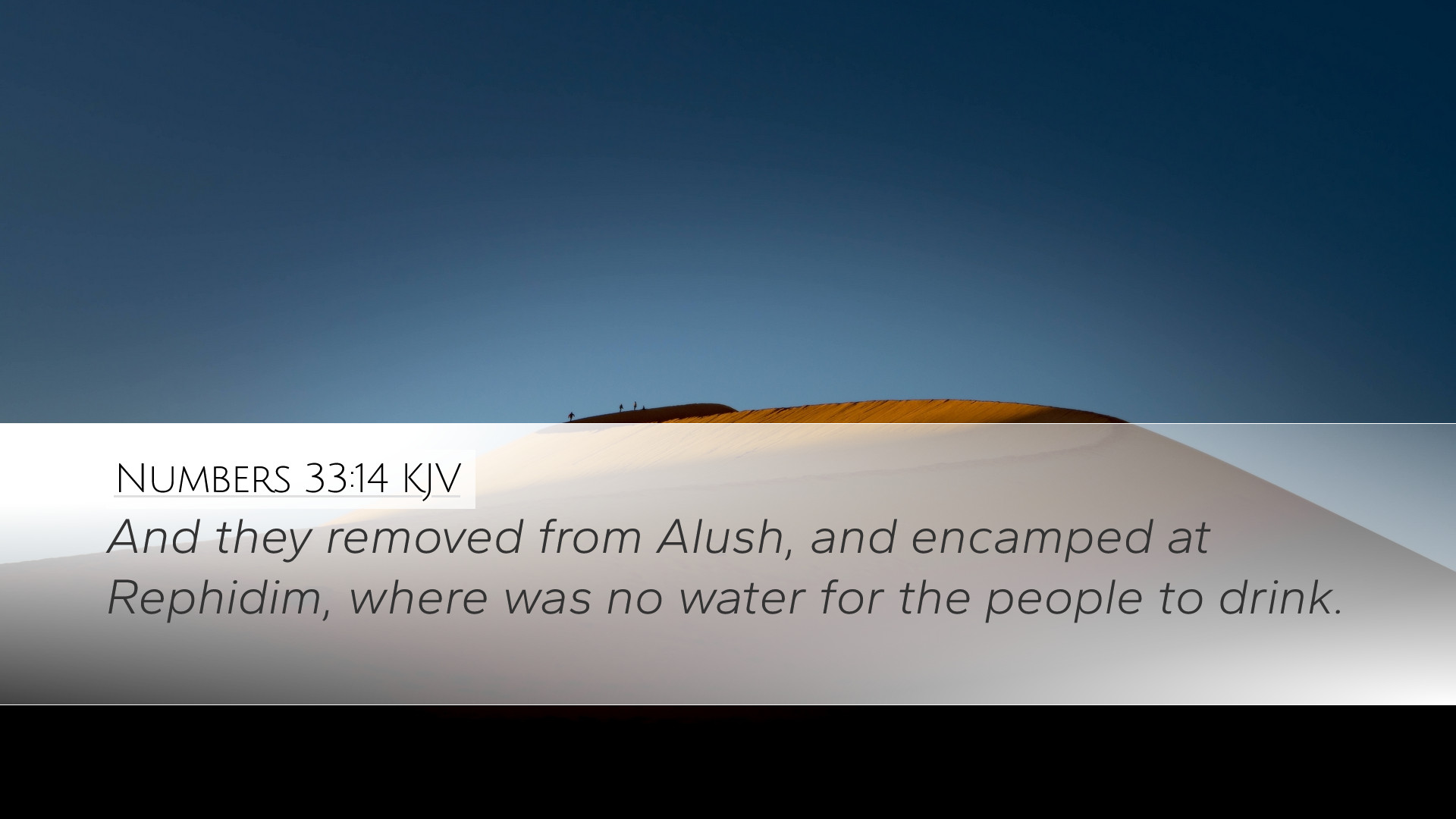Commentary on Numbers 33:14
Bible Verse: Numbers 33:14 (KJV) - "And they removed from Alush, and encamped at Rephidim, where was no water for the people to drink."
Introduction
This verse in Numbers 33:14 marks a significant point in the wilderness journey of the Israelites. It places emphasis not only on the physical movement of the camp, but also on a deeper spiritual lesson regarding reliance on God. This commentary combines the insights from several public domain commentaries to provide a robust understanding of this passage.
Contextual Background
The journey of the Israelites through the wilderness is chronicled in the Book of Numbers. After leaving Egypt, they were led by Moses and faced various challenges that tested their faith and obedience. Numbers 33 provides a chronological account of their encampments, with each location serving as a marker of their progress and the divine providence intervening in their journey.
Commentary Insights
1. The Importance of Place: Alush to Rephidim
As noted by Matthew Henry, the transitions from one encampment to another are not merely geographic but reflect a divine orchestration of events. Each location bears significance in relation to the trials faced by the Israelites. Alush, a place likely representing a moment of respite, is contrasted sharply with Rephidim, where the absence of water raises the alarm of impending crisis.
2. The Struggle for Provision
Albert Barnes underscores the reality that the Israelites often faced dire situations, especially regarding basic needs such as water. Rephidim was marked by scarcity, which amplified their struggle and often led to despair. This situation served as a test of faith, challenging the people to remember God’s previous provisions despite their current plight.
3. A Spiritual Application
Adam Clarke emphasizes the spiritual metaphor found in this narrative. Just as the Israelites had to confront the reality of their need for water, believers are reminded of their dependence on God for spiritual sustenance. The barrenness of Rephidim becomes an allegory for the spiritual drought that can be experienced in the lives of individuals or congregations when they stray from reliance on God.
4. Theophany and Divine Presence
Henry further explores the notion of how God's presence accompanied the Israelites even in moments of deprivation. Rephidim, while a place of lack, was also a provisional site for future miracles. The expectation of God's intervention amidst their need teaches that trials often precede divine revelation and blessing.
5. Leadership as a Testament of Faith
Moses’ role as a leader during this time is critical. He is tasked with addressing the people's concerns and needs, reflecting the burden of leadership that requires faith in God’s promise of provision. Barnes notes that the uncertainty experienced by the Israelites was also a call for Moses to intercede for them, highlighting the vital role of spiritual leadership in times of crisis.
Theological Reflections
1. God’s Faithfulness
Despite the challenges the Israelites faced, there is an overarching theme of God’s steadfast faithfulness. Throughout their journey, they are reminded of His past deliverances which should anchor their faith in present uncertainties. Clarke reiterates that remembrance of God’s previous works serves as a pillar of strength during moments of doubt.
2. Community and Collective Memory
This narrative invites reflection on the importance of community among believers. The Israelites’ journey was not solitary; it was a collective experience that necessitated support, encouragement, and shared faith. Thus, as Barnes asserts, the remembrance of shared experiences of God’s faithfulness can empower communities of faith in future trials.
3. The Call for Perseverance
Numbers 33:14 illustrates the reality of life’s sojourn—there are mountaintops and valleys. Henry emphasizes that perseverance is essential in the face of scarcity and that believers are called to trust in God for sustained strength and hope. Faith does not exempt one from hardship but rather equips one to endure and flourish through it.
Practical Application
The narratives within Numbers, especially this particular verse, hold practical applications for each believer:
- Trust in God’s Provision: True faith acknowledges that God is the source of all needs—physical, emotional, and spiritual. The story of Rephidim teaches that even when circumstances seem dire, God’s faithfulness remains unshakeable.
- Encourage and Support Others: Much like the community of Israelites, the body of Christ is called to support one another in times of need. Sharing in each other's burdens highlights the essence of Christian fellowship.
- Remember God’s Past Faithfulness: In moments of doubt, recalling how God has worked in your life reinforces faith and fosters resilience. Be it through communal worship or personal reflection, remember and testify to His goodness.
Conclusion
Numbers 33:14 encapsulates a significant moment of transition in the life of the Israelites that resonates deeply with the human experience. Through insights from Matthew Henry, Albert Barnes, and Adam Clarke, we observe profound themes of reliance, community, perseverance, and above all, God's unwavering faithfulness. In every wilderness experience, there is the invitation to acknowledge our dependency on God and to encourage one another as we journey forward.


